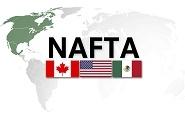Government/Policy

October 14, 2017
U.S. Rules of Origin Proposal Widely Opposed
Written by Sandy Williams
It’s on the table: the U.S. proposal for rules of origin for NAFTA automobiles.
On Friday, the Trump administration made its demand for 50 percent U.S. content in NAFTA-produced cars and trucks and an increase of North American content from 65.2 percent to 85 percent. The increase for U.S. content would be made within the first year of signing a new NAFTA agreement and the regional content would be phased in over a period of years.
In the proposal, steel, aluminum and other raw materials would be added to the tracing list requiring proof of origin as would sophisticated components like electronics. Most electronic systems are manufactured in Asia and were not subject to the original NAFTA agreement because they did not exist two decades ago.
The proposal is viewed as “unworkable” by most parties in the NAFTA negotiations and is seen as another sign that Trump wants negotiations to fail in order to withdraw from the agreement.
Inside U.S. Trade reports that U.S. Trade Representative Robert Lighthizer told Republicans on the Ways and Means committee last week that, regarding NAFTA, he has “an audience of one to please”—President Trump. Such rhetoric is further indication that the contentious proposals being offered by U.S. negotiators are less about improving trade conditions for North American companies and workers and more about pleasing a president who has frequently called NAFTA a “disaster.”
Former Nucor CEO Dan DiMicco defended Lighthizer’s approach to the talks. “Bob Lighthizer is doing exactly what the president has told him to do,” said DiMicco in a comment to Inside U.S. Trade. Withdrawal from NAFTA, said DiMicco, would not be “the end of the world — just the opposite.”
John Murphy, senior vice president for international policy at the U.S. Chamber of Commerce, said in a statement on Friday, “While the American business and agriculture community broadly supports measures to modernize the pact, the Trump administration is pushing a series of proposals that break its pledge to ‘do no harm’ in the negotiations.”
“Higher requirements for North American content would actually incentivize manufacturers to cease trading under the agreement and instead simply pay the low U.S. most-favored nation tariff,” said Murphy.
Jon Johnson, a C.D. Howe Institute senior fellow who was involved in the crafting of auto policy in the original NAFTA agreement said, “I think it’s one of those poison pills. I just think there’s no way, at all, ever, not-no-how, that Mexico and Canada can accept it. I don’t know what they’re thinking. The auto industry hates this.”
Flavio Volpe, president of Canada’s Automotive Parts Manufacturers’ Association, called the U.S. origin proposal “madness” and said that automakers would be willing to pay the 2.5 percent tariff on vehicles that don’t meet NAFTA requirements.
“They’ll just say, ‘You know what, I don’t need to comply with NAFTA. If my price advantage of sourcing out of South Asia is 7 per cent, why wouldn’t I pay the 2.5 per cent tariff?'” said Volpe as quoted by The Star.
“The only ones who are going to win are non-North American suppliers,” he added. “Never mind Canada and Mexico — I know (Trump officials) don’t care. But if you game it out for U.S. industry? Anybody who’s making cars or car parts right now under this scenario, if it was accepted, would be hurt, including workers.”
“Any increase in the rules of origin would add complexity, burden and cost, thus reducing Canada’s competitiveness, as well as the competitiveness of the trade bloc as a whole,” the Canadian Vehicle Manufacturers Association, representing General Motors, Ford and Fiat Chrysler, said in a statement.
Unifor, representing workers in Canada auto and auto part manufacturing, supports higher auto content thresholds in NAFTA and modernizing the list of qualifying parts, but said that thresholds mean little if labor standards and border tariffs are not addressed. In a statement issued Friday, Unifor called the rules of origin proposed by the U.S. “deliberately untenable.”
“The U.S. believes they deserve an unfairly high level of U.S. content in vehicles from Canada or Mexico. This combined with no attempt to fix the underlying labor and tariff problems means they don’t care if our auto industries live or die,” said Jerry Dias, president of Unifor.
“Right now the price of entry into the U.S. market for non-NAFTA passenger cars is a 2.5 percent tariff, and in Canada it is 6.1 percent. That’s far lower than many auto-producing jurisdictions and not a very strong incentive to encourage automakers to build here in North America,” Dias said. “It might prove cheaper for automakers to ignore NAFTA rules and simply pay the 2.5 percent. That won’t help anyone.”
Xavier Mosquet, managing director at Boston Consulting Group and lead author of a new study commissioned by the Motor Equipment Manufacturers Association, refutes the assertion by USTR that stricter rules of origin would shift supply chains and bring jobs back to the U.S. Instead, he said, auto supply chain costs would rise as a result of higher tariffs and would be passed on to consumers.
“It’s extremely difficult to find any positive job impact, in the sense that what is being proposed is unlikely to change the decisions that car manufacturers and suppliers will make in terms of their footprint,” Mosquet said as quoted by Inside U.S. Trade. “So, it will not recreate jobs, but it will actually increase the cost of the products on U.S. grounds.”







